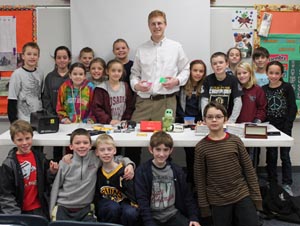Lincoln Laboratory Classroom Presentations
 Lincoln Laboratory scientists and engineers are available to give free presentations in local K-12 classrooms. Presentations and hands-on lab activities are available in general subject areas, and precise areas of study such as archaeology, engineering, chemistry, biology, math, Earth science, and physics.
Lincoln Laboratory scientists and engineers are available to give free presentations in local K-12 classrooms. Presentations and hands-on lab activities are available in general subject areas, and precise areas of study such as archaeology, engineering, chemistry, biology, math, Earth science, and physics. Most presentations can be adapted to different lengths and different grade levels.
To arrange for a classroom presentation, please contact Dr. Todd Rider (thor@ll.mit.edu).
CLASSROOM PROGRAMS
How to Do a Science Project
Demonstrates a variety of experiments. Presentation can be given to individual classrooms or large assemblies to motivate and introduce students to science fair projects several months before the school’s science fair. This presentation can be adapted to elementary, middle, and high schools.
Teacher Workshops
In addition to giving classroom presentations to students, we also run free workshops for teachers. We can customize a workshop for any number of teachers, any grade level, and any topic or range of topics.
How to Become a Scientist
Women in Science and Engineering
Mad Science Show
Archaeology
Reading Ancient Egyptian Inscriptions
This presentation works well for upper elementary, middle school, and high school students.
Reading Ancient Mesopotamian Inscriptions
presentation works well for upper elementary, middle school, and high school students.
Reading Ancient Maya Inscriptions
presentation works well for upper elementary, middle school, and high school students.
Electrical Engineering
Electricity and Magnetism
This presentation supports the MCAS Science Frameworks requirements for electricity and magnetism in elementary schools but can also be adapted for middle school students.
How Computers Work
This presentation uses lots of volunteers to demonstrate how computers work, and it works best for elementary and middle school students.
Robots
This presentation supports the MCAS Science Frameworks requirements for technology and engineering.
How Radios Work
Digital Communications
Artificial Intelligence
Mechanical and Aerospace Engineering
Rockets and Satellites
The presentation supports the MCAS Science Frameworks requirements for physics, technology, and engineering, and optional math can be included to tie it in with algebra and trigonometry if requested.
How GPS Knows Where You Are
This presentation works best for 11th and 12th graders but can also be given to 9th and 10th graders.
Engineering Activities and Competitions
This presentation supports the MCAS Science Frameworks requirements for technology and engineering and works well for elementary and middle school students.
Fluids and Aerodynamics
Radio-Controlled Airplanes
Chemistry
Liquid Nitrogen Show
This presentation works best for middle and high school students.
Slime and Flubber
This presentation shows all of the strange things that plastics and polymers can do. It is suitable for elementary, middle, and high school students.
Nuclear Chemistry
This presentation supports the MCAS Science Frameworks requirements for nuclear chemistry for high schools.
Everyday Chemistry
Chemistry of the Elements
Chemistry Magic Show
Biology
Fossils
This presentation supports the MCAS Science Frameworks requirements for fossils and works well for elementary, middle school, and high school students.
Evolution
This presentation supports the MCAS Science Frameworks requirements for evolution and works well for middle school and high school students.
Biotechnology
This presentation supports the MCAS Science Frameworks requirements for biology and works best for upper elementary, middle school, and high school students.
Forensic Science
This presentation covers forensic laboratory techniques, with hands-on activities for the students to make and categorize fingerprints, dust surfaces for latent fingerprints, extract DNA (from an onion), and match printouts of DNA profiles with those from 'suspects.'
Math
MathBusters!
This presentation works best for upper elementary and middle school students.
Calculus Made Easy
Powers of 10 (from subatomic particles to the universe)
Identifying Rocks and Minerals
This presentation supports the MCAS Science Frameworks requirements for rocks and minerals in elementary schools but can also be adapted for middle school students.
Black Holes and Wormholes
We give a nonmathematical introduction to special and general relativity using PowerPoint slides and video clips. This presentation is best for high school students.
Weather and Forecasting
This presentation supports the MCAS Science Frameworks requirements for weather in elementary schools but can also be adapted for middle school students.
From the Big Bang to Now
This talk supports the MCAS Science Frameworks requirements for the origin and evolution of the universe for high schools, but it can also be adapted for middle schools.
Solar System
Our tour of the solar system uses PowerPoint slides, DVD clips, demonstrations, and hands-on activities, and it can be adapted to elementary, middle, and high schools.
Earth's Interior and Plate Tectonics
Global Warming
Water and Soil Testing
Astronomy and Telescopes
Terraforming for Tots
Physics
Forms of Energy
This presentation supports the MCAS Science Frameworks requirements for forms of energy in elementary and middle schools.
Heat and Thermodynamics
This presentation supports the MCAS Science Frameworks requirements for heat energy and heat transfer in middle schools and technology and engineering in high schools.
Sound Waves and Acoustics
This presentation supports the MCAS Science Frameworks requirements for sound and waves and can be adapted for elementary, middle, or high school students.
Optics and Lasers
This presentation demonstrates the properties of optics, lasers, and light. It supports the MCAS Science Frameworks requirements for light and electromagnetic radiation and can be adapted for elementary, middle, or high school students.
Newton's Laws
Simple Machines
Gyroscopes
Infrared Imaging
Quantum Physics
Antimatter
| WEBSITE | ↑ top |
www.ll.mit.edu/outreach/ClassPresentations.html
| LOCATION | ↑ top |
Lexington
| RELATED LINKS | ↑ top |
- Profiles
- Localities
Info changes frequently. We cannot warrant it. Verify with Lincoln Laboratory Classroom Presentations before making the trek. If you find an error, please report it...

